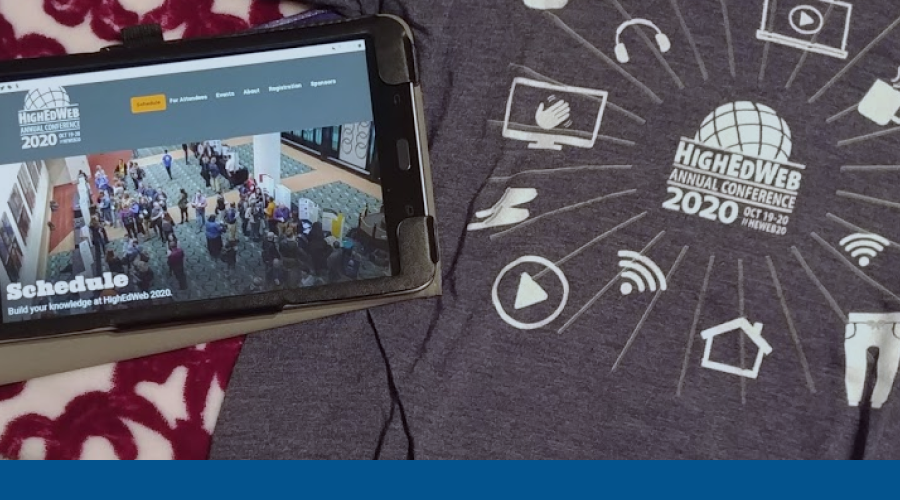HighEdWeb20 Golden Nuggets
By Jeanine | 2020-10-23
Another HighEdWeb Conference is now behind us! Discover my golden nugget as well as highlights and actionable tips from three other presentations from this year's annual conference.
Although 2020 has brought waves of isolation, it has also created the opportunity for more online conferences than ever.
After attending HighEdWeb’s Accessibility Summit in June, I was extremely excited to be able to attend my first HighEdWeb Annual Conference since 2014 (Portland, OR!)
We dove into the first day with a quick welcome and a round of lightning talks. The lightning talks were perfect for this platform—quick, 10-minute sessions about various topics to give you an overview of subjects you might want to delve into deeper afterward. The conference continued with three stages of presenters, visits to sponsors, poster presentations, and networking.
What is a golden nugget?
Without the normal welcome, the term “golden nugget” may have been a bit confusing to first-time attendees. When I first attended in 2010, we were all encouraged to find your one (and only one) golden nugget. This is the actionable piece that you can take away from the conference. Having only one allows you to focus on achieving or implementing that one takeaway instead of having three (or ten!) new items that never see light again after the conference ends.
My Golden Nugget
Wipe down your desk at the end of each day
Jon-Stephen Stansel shared this tip during his talk “Mise-En-Place.” By wiping down your desk, you’re signaling the end of the day. When you return in the morning, a clean desk is ready to greet you. (This also transformed into a thread about sharing our desk buddies.)
Other Nuggets in the Box
Gather students to give stories and testimonials
Rebekah Wright’s “Casting Call: Finding Student Stories” reinforced the importance of finding students’ stories and documenting them in a way your team can review and implement into pages tailored toward prospective students. The student’s reward? The chance to be “famous!” A few notable items:
- Ask for students’ stories at the beginning of the school year when they are most excited about the semester.
- Note which students are most comfortable with the camera—ask them to help again when you need additional footage.
- Request a student’s help directly by messaging them.
Visit SBU’s Casting Call form to see how their students get involved.
Use plain language as often as possible
Rewriting paragraphs of text into plain language may seem like a daunting task, but Rachell Underhill’s presentation “(Plain) Language Matters” provided examples and resources to get started. By rethinking documents, web pages, and FAQs, you can increase scanability and help readers find information more quickly. Improving content arrangement (grouping similar information and removing redundancy) also helps you spend less time answering questions. Here are some actionable items to help you get started:
- Use the active voice.
- Create tables to simplify content.
- Check your reading grade level using Hemmingway, Readable.io, or SiteImprove.
- View recommended word usage and examples from https://plainlanguage.gov/.
Here’s a fun tip from an attendee about removing passive voice: "…If you can add ‘by zombies’ to the sentence and it still makes sense, it’s written in passive tense."
Web Components
Finally, Nikki Massaro Kauffman’s lightning talk, “Old School HTML with Modern Web Components,” shared how her school created its own library of components. Learn more about using Web Components in NikkiMK’s series “Baby Steps to Web Components.”
Your turn!
HighEdWeb’s conference continued its culture of learning and networking—be sure to find more golden nuggets on Twitter. If you’re interested in watching the materials from #HEWeb20, you can become a member and access the Professional Development Library on your own time.



